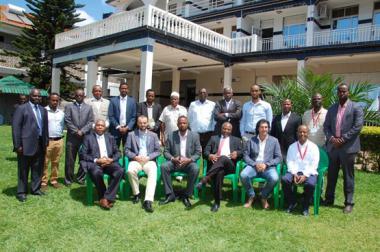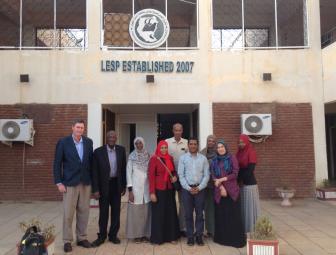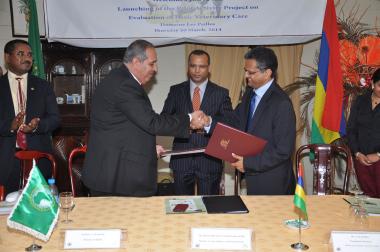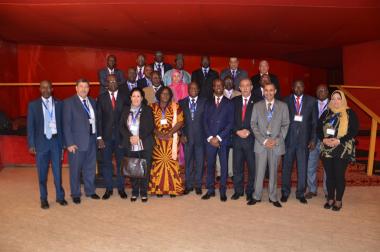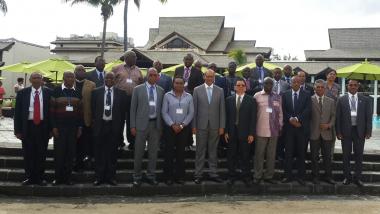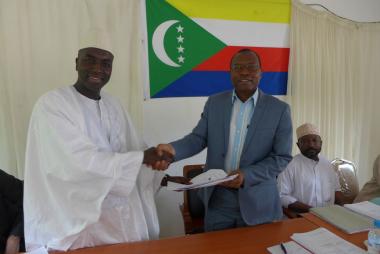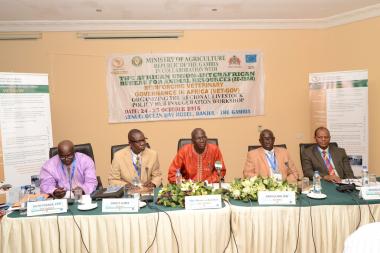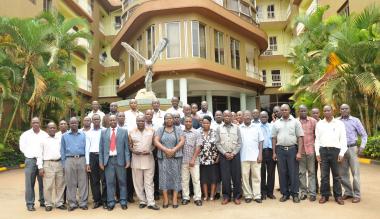The Resilient African Feed and Fodder Systems Project, or RAFFS, is working to strengthen Africa's feed and fodder sectors in the face of global crises. Its goal is to address the challenges posed by the triple crises of Covid-19, Climate Change shocks, the Russia-Ukraine conflict, and other geopolitical conflicts that affect Africa's feed and fodder systems.
The project began in January 2023 and has made significant progress in understanding the impacts of these crises on the feed and fodder sectors in six African Union Member States: Uganda, Cameroon, Kenya, Nigeria, Somalia, and Zimbabwe. Through workshops, surveys, and stakeholder engagements, RAFFS is collecting crucial data to inform evidence-based solutions and policy interventions.
This week, the technical team is in Uganda undertaking major project activities. One of these activities is the establishment and strengthening of country-specific Feed and Fodder Multi-Stakeholder Platforms (MSPs). These platforms bring together various stakeholders, including government agencies, agricultural organizations, private enterprises, civil society, banking, insurance, and media, to address the challenges faced by the feed and fodder sector.
The formation of MSPs is just one part of the comprehensive approach taken by the RAFFS Project. Other activities include: Capacity building for media on implementing communication strategies, capacity building for data and data management systems, management and reforming policies, conducting inventories of feed and fodder resources, and formalizing the African Women in Animal Resources Farming and Agribusiness Network (AWARFA-N).
Dr. Theophilus Mwasigye, Commissioner and Director of Animal Production at the Ministry of Agriculture, Animal Industry, and Fisheries in Uganda, emphasized the importance of collaborative efforts in tackling challenges in the feed and fodder sector. He noted that the establishment of multistakeholder platforms is essential for fostering cooperation and coordination among key actors in the sector.
Uganda, with its large livestock population and abundant feed resources, should be able to support the sector. However, challenges such as drought-induced shortages persist. Dr. Mwasigye highlighted the significance of animal nutrition, which is often overlooked in livestock production despite its critical role. He emphasized the importance of the RAFFS project in addressing the triple crises. "There is a need to reorganize and build capacity at both local and national levels to support livestock farming communities and drive the sub-sector forward. Updating policy and legal frameworks is critical to aligning with the needs of the feed and fodder sub-sector. The private sector should be more engaged, and farmers and value chain actors will be crucial for promoting feed production through advocacy and self-regulation to ensure quality and safety," he added.
The Director of AU-IBAR, represented in the meeting by Dr. Annie Lewa, highlighted the importance of establishing a structured and functional MSP for the feed and fodder sector. Drawing on insights from the RAFFS Project's continental survey on the impact of the triple crises, it was revealed that none of the African Union Member States currently have an MSP for their feed and fodder sectors. This underscores the urgent need for better coordination and collaboration among stakeholders to effectively address the sector's challenges.
During the meeting, stakeholders reflected on the status of Uganda's feed and fodder sub-sector, which was initially categorized as 'emerging' but later redefined as 'unstructured' following an assessment of the sector's resilience to the triple crises. Feed, which constitutes over 60% of the total cost of livestock production, remains a poorly developed supply chain, contributing to market failures and hindering efforts to ensure food and nutrition security.
The Director emphasized the need for coordinated action to drive growth and investment in the feed and fodder sub-sector, urging stakeholders to consider key questions such as the drivers of growth, the role of different actors, and the necessary investments for sectoral development. Additionally, the establishment of an MSP requires articulation of its unique mandate and role, with input from all relevant stakeholders to ensure ownership and legitimacy.Acknowledging Uganda's role as the first Member State to take this important step, the Director commended the efforts of all participants and called for productive deliberations towards the establishment of the Uganda Feed and Fodder MSP. "It is crucial for stakeholders to draw on their expertise and experiences to shape a functional platform that comprehensively addresses the challenges in the sector. Different stakeholders are gathered here today, including those involved in aquaculture. Since the start of Covid-19, which impacted the importation of feed ingredients, the Uganda aquaculture sector, previously the third largest on the continent, has shrunk by 30% largely due to feed challenges."
The Director reiterated AU-IBAR's commitment to supporting the operationalization and growth of the MSP, underscoring the organization's dedication to fostering collaboration and resilience in Africa's feed and fodder sector. The workshop brings together representatives from various sectors, such as poultry farming, aquaculture, and apiculture, to create an opportunity for stakeholders to discuss the effects of feed and fodder shortages and develop strategies to build resilience.
In the future, the RAFFS Project strives to improve the sustainability and resilience of the feed and fodder sector throughout Africa by promoting informed decision-making, strong data management, and the empowerment of stakeholders. Through collaboration, African nations can establish a more vibrant and resilient feed and fodder subsector that supports food security, economic development, and livelihood improvement across the continent.
About AU-IBAR:
AU-IBAR operates as a technical office within the African Union Commission, with a core mission to support African Union member states in harnessing the potential of animals for human well-being and economic development. The organization plays a pivotal role in coordinating and advancing livestock development across the continent.
Note to Editors:
For additional information, please visit AU-IBARs website on RAFFS
For more Project information contact Dr. Sarah Ashanut Ossiya - sarah.ossiya@au-ibar.org
For communications and media inquiries, contact: Fiona Imbali- fiona.imbali@au-ibar.org
RAFFS Uganda Focal person: Contact Denis Mulongo Maholo- denis.mulongo.maholo@gmail.com

